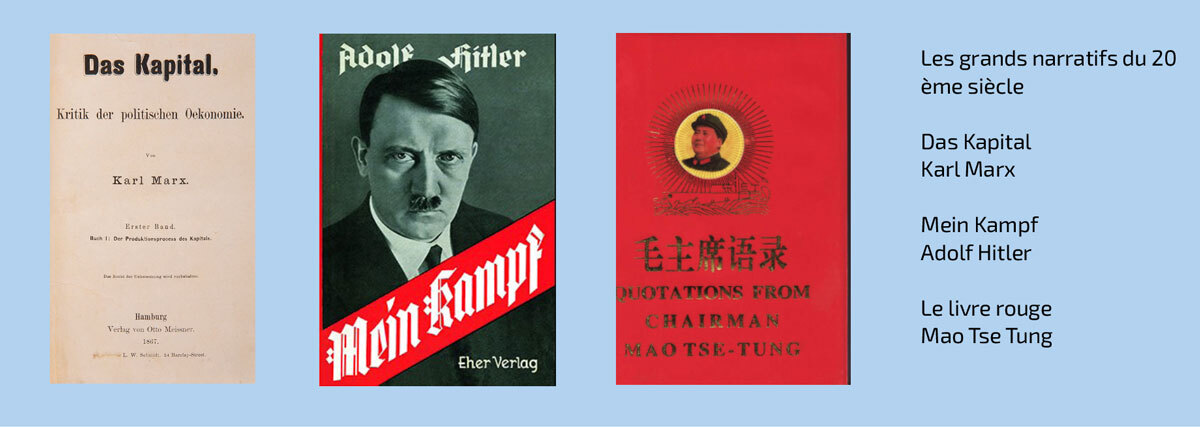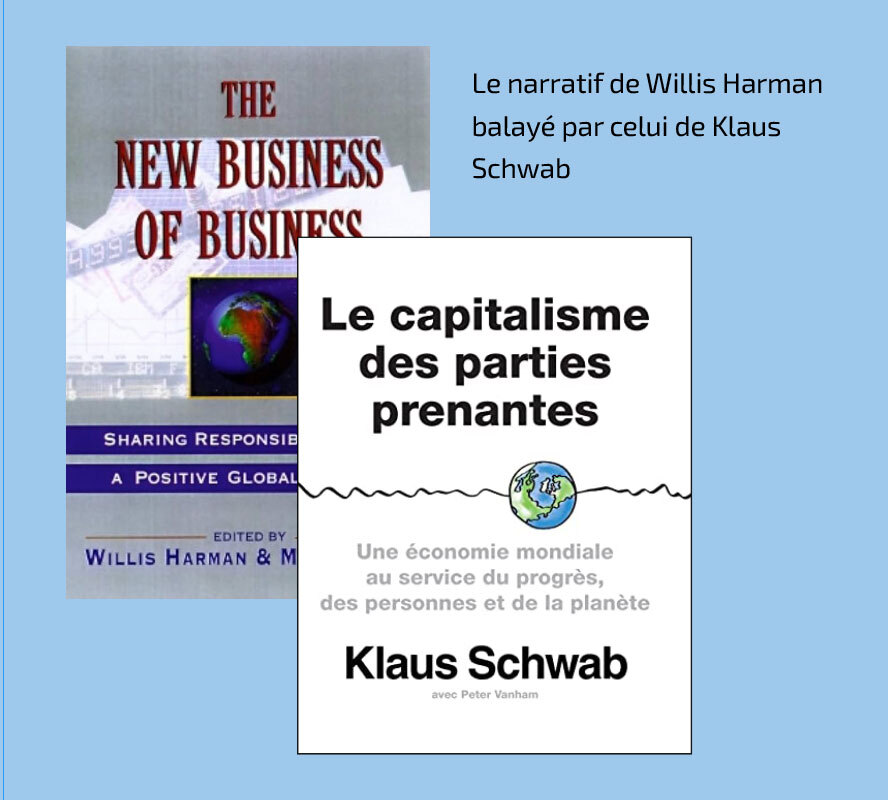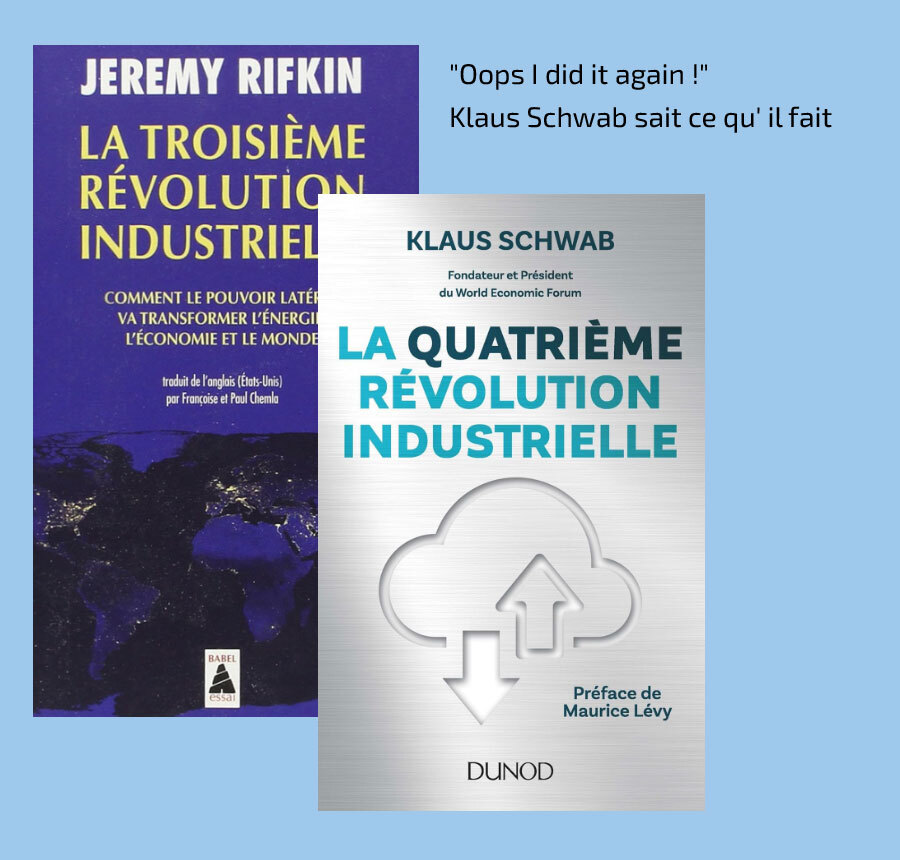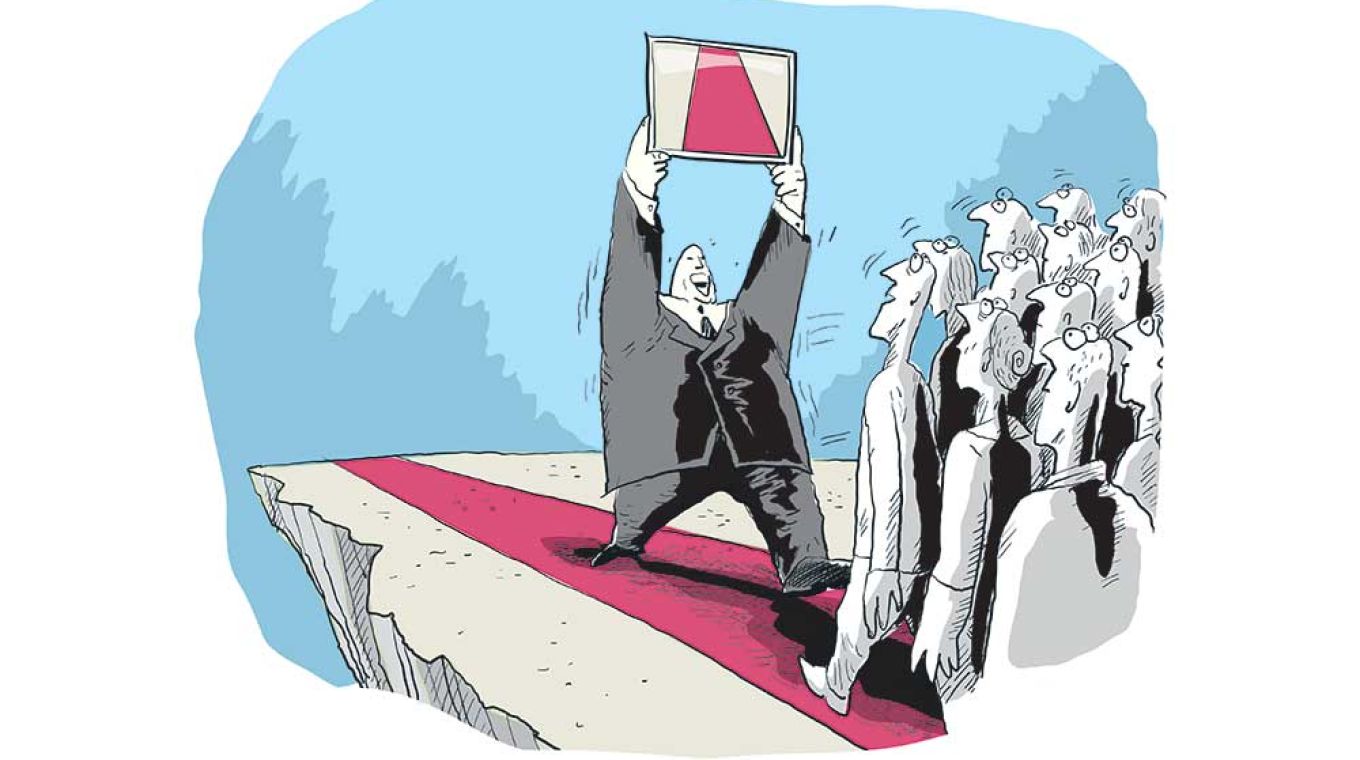by Marc Luyckx Ghisi & Daniel de Wolff
In history, religions and their interpretations have formed extremely powerful narratives that have mobilized millions of people for centuries.
The Quran, a book initially taught by a small group of fighters, later generated thousands of warriors to Islamize the Arab world in a rapid expansion.

One holy book follows the next: The Torah (ca. 450-350 BC), the Bible (ca. 50 - 100 AD) and the Koran (ca. 650 - 655 AD)
Another example is the Crusades, which were the response of a very powerful counter-narrative (Catholic) that also justified violence for centuries. In a similar vein, one can mention the story of Mao's Little Red Book or Hitler's Mein Kampf.
In the tumultuous period we are living through, there are various possible stories, different supporters, and thus a merciless struggle between different narratives. We propose to develop here the narratives of the economic vision of our capitalist system.

The most influential books of the 20th century: Karl Marx's "Das Kapital", Adolf Hitler's "Mein Kampf" and Mao Tse-Tung's "Red Book"
THE WEF: The Narrative Dominating Since 2022
We have already discussed the "World Economic Forum" or "Davos Forum" (WEF). In a previous article, we explained how the annual meetings in Davos have become the cornerstone of the rapprochement between multinationals and political leaders, shielded from ordinary citizens. The idea of a "public-private partnership" encourages a blending of government and public service interests with those of businesses.
At their last meeting (Davos January 2024), members of this forum reaffirmed that their main goal was to establish and strengthen the "private-public partnership."2
In fact, within this WEF partnership, private entrepreneurs are so financially powerful that they quietly impose their "private" vision on politicians who should be focusing on the common good, but who, in reality, can no longer do so. It is a partnership that shows no interest in the common good and promotes the dominance of the "private" vision of today's financial powers.
We discover in WEF publications, as well as in videos featuring Klaus Schwab himself, that the 2030 Agenda or the New World Order is a plan for global governance by large corporations, where humans have become transparent and lack privacy, in a green world directed by artificial intelligence and robots. Humans are "enhanced" through genetic modifications, and diseases are prevented through constant vaccinations. The right to privacy no longer exists: "You should not be afraid if you have nothing to hide," explains Klaus Schwab.
THE WBA: The Narrative That Dominated the USA in 1995
The "World Business Academy" (WBA) was founded in 1987 by engineer and futurist Willis Harman and economist Rinaldo Brutico (the current President).
 The WBA's threefold mission today is (worldbusiness.org):
The WBA's threefold mission today is (worldbusiness.org):
1. To shift the awareness of business leaders from that of predator to steward, as people act differently if they believe they are responsible for the outcome.
2. To evolve the consciousness of young people entering business, particularly in our business schools, to see that they are entering a noble profession rather than a jungle, because one acts differently in a temple or church than in the jungle.
3. To raise the awareness of the general public so that they invest their money where their deep values lie, because if the general public does this, businesses will immediately pay attention to those values.
The Action of the WBA: For the Common Good
In industrial society, business only takes care of itself and not of society. Indeed, it creates jobs by generating added value that transforms into company profit. Through taxes, business enables states to assist the population (education, healthcare, defense, security, etc.). Therefore, it is politicians who redistribute tax money towards the common good of citizens. Business does not directly concern itself with the common good.
However, for the WBA, there exists "The NEW Business of Business"3 business must ALSO care for the common good of humanity.
The WBA recognized that large companies have become global actors that are often more important and powerful than many states. It seemed obvious that the leaders of these large companies must individually and collectively assume a new global responsibility towards the common good of all humanity. In this context, the WBA proposed a new type of ethical partnership between states and business.
In "The New Business of Business," the founder of the WBA, Willis Harman, observes that our industrial system creates the following situation:
- Systematic destruction of our natural environment
- Systematic destruction of human communities
- Systematic transfer of wealth to the top of the pyramid
- Systematic marginalization of people and cultures
- Systematic erosion and denial of spiritual meaning and the sacred
- Systematic concentration of power in unelected hands
- Systematic learning of incapacity and a sense of powerlessness.
And it is exactly these phenomena denounced by W. Harman 30 years ago that we are witnessing today.
Given their positioning as a public-private partnership, the WEF will do nothing to eliminate these seven negative effects. On the contrary, it seems they will amplify them, as the common good of humanity does not appear in their objectives. Even though, as we indicate elsewhere in our recent book, the inner change of billions of citizens may be reversing the tide of the global machine.
Jeremy Rifkin Swept Aside by Klaus Schwab ?
The famous American futurist Jeremy Rifkin launched a very interesting narrative in his book “The Third Industrial Revolution”5 (2012). In it, he proposes a world detached from oil, free from fossil and nuclear energies, a green, clean, pollution-free, and decentralized world. A green deal to create a livable future for our children while simultaneously empowering consumers. He advocates for "collaborative commons," a culture of sharing, a kind of social organization based on the interests of the community rather than on individual desires, made possible through the internet. For a time, doors opened for him; the business world and civil society began to shift. Rifkin was riding the wave created by Al Gore and his narrative of climate change caused by humans. He had everyone's attention, as this narrative appeared to be an opportunity to change the economic paradigm.
The Industrial Revolution of Schwab
Five years after the publication of this book, the President of the WEF, Klaus Schwab, took the stage. He also redefined a narrative in his book “The Fourth Industrial Revolution”6 (2017), promoted through significant communication efforts.
 Schwab is at the opposite end of Rifkin. In the Fourth Industrial Revolution, Schwab promotes a hyper-technological transhumanist future. Humans and machines converge. Pollution? Not a problem. Glyphosate? So what. It's business as usual for large corporations.
Schwab is at the opposite end of Rifkin. In the Fourth Industrial Revolution, Schwab promotes a hyper-technological transhumanist future. Humans and machines converge. Pollution? Not a problem. Glyphosate? So what. It's business as usual for large corporations.
We are witnessing a “perversion” of Rifkin's narrative. On both sides, there is talk of industrial revolution, but the meaning is completely inverted.
The Crisis of Global Narratives
We are living at the end of an era. The old narratives of globalism, neo-capitalism, and consumer society are outdated. The new narrative imposed by Klaus Schwab and his allies of a transhumanist world does not excite anyone, as soon as we rationally dissect it. But this is a key point: the power of a carefully distilled and assimilated narrative is that it delegates to the citizen themselves the function of censorship.
We need a new story, with new ideas, or rediscovered ideas, perhaps those that have already been developed and set aside, like those of Rifkin? Only a vision that aligns with the common good will have the potential to change the future.
This article appeared in the Zèbre Magazine N°3 / www.zèbre-magazine.com
1. Marc LUYCKX & Daniel de WOLFF: “Who Elected Klaus SCHWAB?” ZEBRE No. 2 May-June 2024, p. 29.
2. See “THE GLOBAL RISKS REPORT” from the WEF, January 2024: “It is our hope that the report serves as a vital call to action for open and constructive dialogue among leaders of government, business, and civil society to take action to minimize global risks and build upon long-term opportunities and solutions.”
3. This new maxim has become the title of an important book: Willis HARMAN: The New Business of Business, 1997.
4. Aurélie PIET & Marc LUYCKX-GHISI: Two Billion Reenchanted: The Manifesto of Change Agents. Éditions ACTES SUD, Arles, 2023.
5. Jeremy RIFKIN: The Third Industrial Revolution: How Lateral Power is Transforming Energy, the Economy, and the World. Publisher Les Liens qui libèrent, Paris 2012.
6. Klaus SCHWAB: The Fourth Industrial Revolution. Dunod, Paris 2017.


